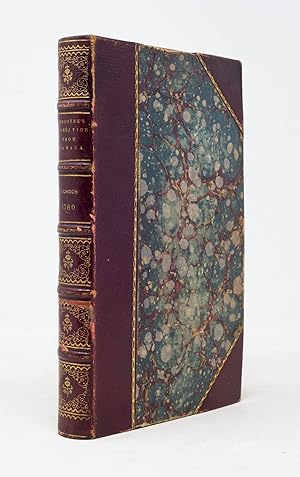About this Item
The Second Edition. London: Printed for J. Almon, 1780. Octavo (8 5/16" x 5 1/16", 211mm x 128mm). [Full collation available.] With 6 hand-outlined engraved folding maps and a folding letterpress table. Bound in (slightly later?) half red roan over marbled boards. Gilt roll at the edges of the roan. On the spine, five raised bands. Panels gilt. Title gilt to the second panel, imprint gilt to third. Marbled end-papers (to match the boards). All edges of the text-block speckled red. Rubbed generally, with some spots of wear. Remnants of a paper spine-label in the fifth panel. First free end-paper loose and chipped at the lower edge. Final binder's blank loose. Dampstain to the upper edge, not affecting the text. Mildly and evenly tanned throughout. Armorial bookplate of Baron Eliot to the verso of the initial binder's blank. John Burgoyne (1722-1792) was put in command of the British forces in Canada in 1777 after outlining what he considered the errors and insufficient boldness of his own commanding officer, Guy Carleton. His plan was to move south from Quebec and to retake the entire Hudson River valley down to the City of New York, with the aim of stranding New England from southern reinforcement. He got only as far as Saratoga, having failed to coordinate his rendezvous with the forces of Clinton and Howe. On 17 October he surrendered the whole of his army, some 5,800 men, to Horatio Gates. It was the Americans' greatest victory to date, and was crucial in convincing the French to join the fight. Modern historians consider the episode the critical point in the American Revolution's success. "Gentleman Johnny" returned to Britain with Washington's permission in order to defend his conduct, and the present volume is the account of that defense to the House of Commons, and more broadly to rehabilitate his career and to restore his name. That was his sole victory; he would go on to be a Privy Councilor, Commander-in-Chief of Ireland and Colonel of the King's Own Regiment -- to say nothing of a considerable success in the theatre, both on his own and in partnership with Richard Brinsley Sheridan. The bookplate of the Baron Eliot (motto: praecedentibus insta, press hard upon leaders) belongs either to the first or to the second; in 1815 the second Baron Eliot was created Earl Eliot of St Germans. The former, Edward, Baron Eliot (1727-1804; created Baron Eliot 1784) sat in the House of Commons from 1748-1784, including as member for Cornwall 1775-84, during which General Burgoyne will have made his defense (doubtless Eliot's motto will have been ringing in his ears). The latter, John, Baron Eliot 1804-1815 and Earl of St Germans 1815-1823, also sat in Parliament 1784-1804; he was made Colonel of the East Cornwall Militia. In either case, the connection to Burgoyne (either as his judge or as a fellow military-man) is strong. Howes B968, Lande 69, Sabin 9255.
Seller Inventory # 6JLR0134
Contact seller
Report this item




